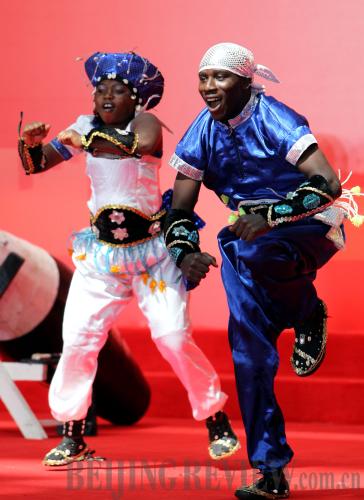|
 |
|
(FAN JUN) |
What message are you sending with the name Hwendo Na Bua?
[It] means that we must not lose our culture which is alive and rich. This is the message we are trying to bring to all the corners of the world where we go. You've seen the dance Sakpata. It is a ritual dance. You've also seen the dance Zangbeto, which is typically Beninese. When performing this dance, we become different animals: turtles, snakes and others. In our country, this is a tradition. This is our culture. And we can not lose it.
How does your company showcase Beninese dance?
There is, for example, the dance Zinli. We've performed it here. It is a dance of the royal court of Abomey (a city in south Benin). It is usually performed by princes and princesses at a big ceremony organized by the King. It's really popular. There is also the Teke dance, the Adjogan and the Goumbe. The Goumbe is a very typical one in Collines (a central region), and widely known in Benin.
To dance in our country, we use our shoulders and waist a lot, as what the princes and princesses did when they performed traditional dances. Then we add just a few choreographic elements.
Do the costumes have an importance of some kind?
Yes, absolutely. You saw the Tipenti, a dance of hunter. You can tell it from the fur collars worn by the dancers. The hunters kill animals, make collars with their fur. So we use the fur collars in our costumes to perform this dance. For the dance Sakpata, you could see the skirt, which is a peculiar dress to that dance.
In Africa, many countries have their own dance and music traditions. What sets Beninese dance apart?
Our traditions are different in that we do not play djembe. In Africa, the djembe usually rhythmizes the music, but here we have another kind of tam-tam (drum), which is typically Beninese.
You also saw a Chinese company perform here. What do you think of their dancing?
Personally I love Chinese dances, especially the choreography, which is always well synchronized. It is for this reason that Chinese dancers came to our country. They taught us their dances and we taught them ours.
You just finished performing at the Shanghai Expo. Tell us your story there.
It went very well. We presented 32 performances, two shows a day during 16 days. I think it was a success; otherwise the show would not have been scheduled every day. People really liked [our dance]. I do not mean that we are the best, but I think we are one of the best bands to have acted there.
What are your plans after leaving Qinghai?
We'll go back to Benin in order to prepare for our tour in the United States. We have two months of preparation [at] home and then we'll leave for America for a month and a half. n |